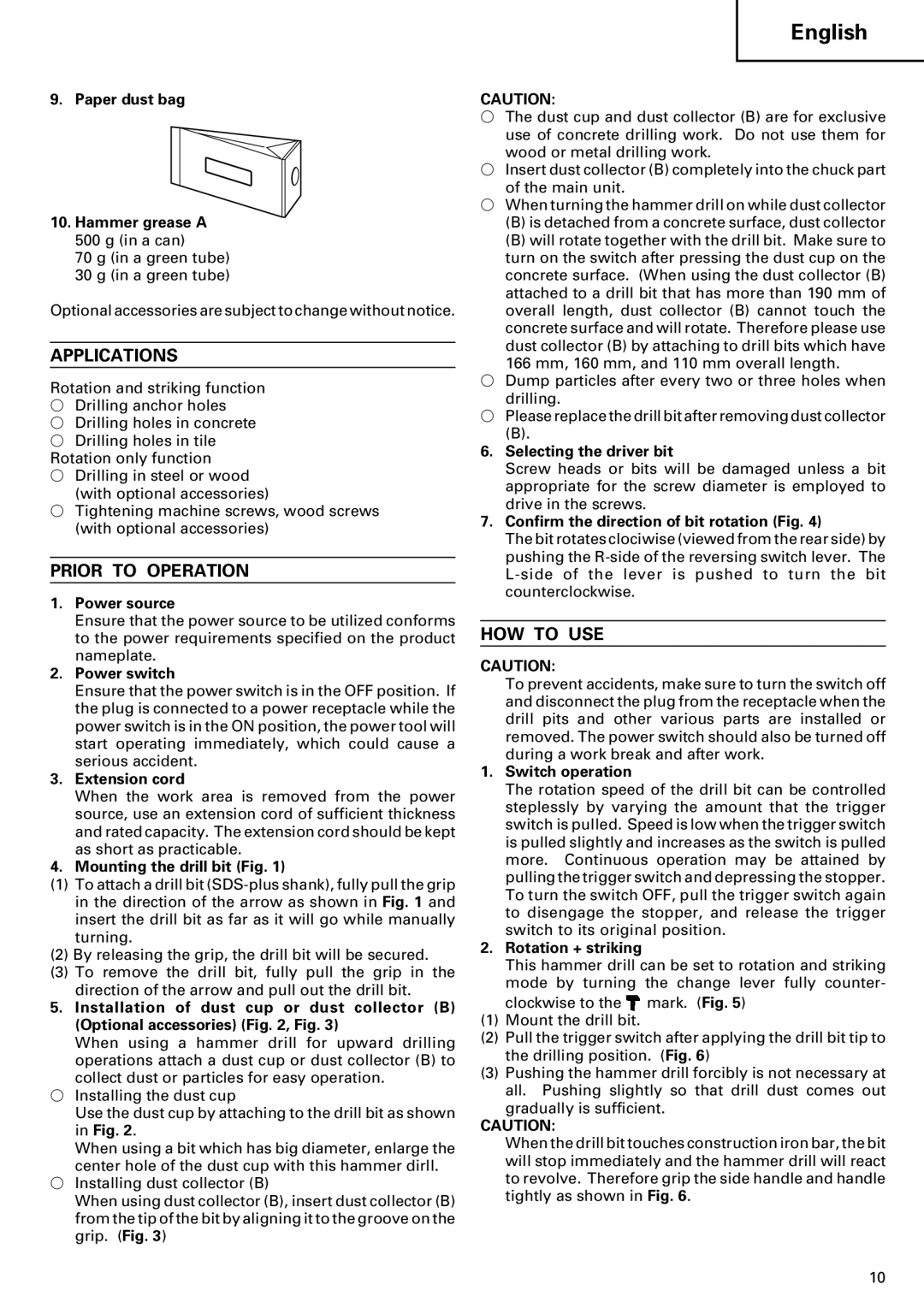
English
9. Paper dust bag
10.Hammer grease A 500 g (in a can)
70 g (in a green tube)
30 g (in a green tube)
Optional accessories are subject to change without notice.
APPLICATIONS
Rotation and striking function
◯Drilling anchor holes
◯Drilling holes in concrete
◯Drilling holes in tile Rotation only function
◯Drilling in steel or wood (with optional accessories)
◯Tightening machine screws, wood screws (with optional accessories)
PRIOR TO OPERATION
1.Power source
Ensure that the power source to be utilized conforms to the power requirements specified on the product nameplate.
2.Power switch
Ensure that the power switch is in the OFF position. If the plug is connected to a power receptacle while the power switch is in the ON position, the power tool will start operating immediately, which could cause a serious accident.
3.Extension cord
When the work area is removed from the power source, use an extension cord of sufficient thickness and rated capacity. The extension cord should be kept as short as practicable.
4.Mounting the drill bit (Fig. 1)
(1)To attach a drill bit
(2)By releasing the grip, the drill bit will be secured.
(3)To remove the drill bit, fully pull the grip in the direction of the arrow and pull out the drill bit.
5.Installation of dust cup or dust collector (B) (Optional accessories) (Fig. 2, Fig. 3)
When using a hammer drill for upward drilling
operations attach a dust cup or dust collector (B) to collect dust or particles for easy operation.
◯Installing the dust cup
Use the dust cup by attaching to the drill bit as shown in Fig. 2.
When using a bit which has big diameter, enlarge the center hole of the dust cup with this hammer dirll.
◯Installing dust collector (B)
When using dust collector (B), insert dust collector (B) from the tip of the bit by aligning it to the groove on the grip. (Fig. 3)
CAUTION:
◯The dust cup and dust collector (B) are for exclusive use of concrete drilling work. Do not use them for wood or metal drilling work.
◯Insert dust collector (B) completely into the chuck part of the main unit.
◯When turning the hammer drill on while dust collector
(B)is detached from a concrete surface, dust collector
(B)will rotate together with the drill bit. Make sure to turn on the switch after pressing the dust cup on the concrete surface. (When using the dust collector (B) attached to a drill bit that has more than 190 mm of overall length, dust collector (B) cannot touch the concrete surface and will rotate. Therefore please use dust collector (B) by attaching to drill bits which have 166 mm, 160 mm, and 110 mm overall length.
◯Dump particles after every two or three holes when drilling.
◯Please replace the drill bit after removing dust collector
6.Selecting the driver bit
Screw heads or bits will be damaged unless a bit appropriate for the screw diameter is employed to drive in the screws.
7.Confirm the direction of bit rotation (Fig. 4)
The bit rotates clociwise (viewed from the rear side) by pushing the
HOW TO USE
CAUTION:
To prevent accidents, make sure to turn the switch off and disconnect the plug from the receptacle when the drill pits and other various parts are installed or removed. The power switch should also be turned off during a work break and after work.
1.Switch operation
The rotation speed of the drill bit can be controlled steplessly by varying the amount that the trigger switch is pulled. Speed is low when the trigger switch is pulled slightly and increases as the switch is pulled more. Continuous operation may be attained by pulling the trigger switch and depressing the stopper. To turn the switch OFF, pull the trigger switch again to disengage the stopper, and release the trigger switch to its original position.
2.Rotation + striking
This hammer drill can be set to rotation and striking mode by turning the change lever fully counter-
clockwise to the ![]() mark. (Fig. 5)
mark. (Fig. 5)
(1)Mount the drill bit.
(2)Pull the trigger switch after applying the drill bit tip to the drilling position. (Fig. 6)
(3)Pushing the hammer drill forcibly is not necessary at all. Pushing slightly so that drill dust comes out
gradually is sufficient.
CAUTION:
When the drill bit touches construction iron bar, the bit will stop immediately and the hammer drill will react to revolve. Therefore grip the side handle and handle tightly as shown in Fig. 6.
10
